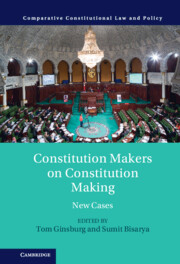Book contents
- Constitution Makers on Constitution Making
- Comparative Constitutional Law and Policy
- Constitution Makers on Constitution Making
- Copyright page
- Contents
- Contributors
- Acknowledgments
- 1 Introduction
- 2 Making and Remaking Kenya’s Constitution
- 3 Kosovo’s Independence Constitution
- 4 Decisions, Deadlocks and Deadlines in Making South Africa’s Constitution
- 5 Makers of Our Own History
- 6 Nepal’s Constitutional Development and the Challenges of Constitution Making
- 7 The Constituent Process in Ecuador
- 8 Burundi
- References
8 - Burundi
The Search for Constitutional Peace
Published online by Cambridge University Press: 03 November 2022
- Constitution Makers on Constitution Making
- Comparative Constitutional Law and Policy
- Constitution Makers on Constitution Making
- Copyright page
- Contents
- Contributors
- Acknowledgments
- 1 Introduction
- 2 Making and Remaking Kenya’s Constitution
- 3 Kosovo’s Independence Constitution
- 4 Decisions, Deadlocks and Deadlines in Making South Africa’s Constitution
- 5 Makers of Our Own History
- 6 Nepal’s Constitutional Development and the Challenges of Constitution Making
- 7 The Constituent Process in Ecuador
- 8 Burundi
- References
Summary
In August of 2000, after the intervention of international mediators, the government of Burundi and seventeen political parties signed the Arusha Peace and Reconciliation Agreement for Burundi with a constitution finally being signed in 2005. Burundi’s iterative cycles of ethnic violence and the underlying mistrust between the minority Tutsi, which controlled the military, and the majority Hutu are the backdrop on which the constitutional process was set. The entire process, based on the Peace of Arusha, was plagued by anxiety and insecurity, and the country to this day has not managed to find stable footing. From the debates over parliamentary apportionment to more recent struggles of the CNDD-FDD party to erase or rewrite the agreements made at Arusha, questions remain over the constitution’s initial intentions as well as its future.
- Type
- Chapter
- Information
- Constitution Makers on Constitution MakingNew Cases, pp. 252 - 276Publisher: Cambridge University PressPrint publication year: 2022

